Lakis Fourouklas's Blog, page 28
March 7, 2012
Book Review: The Colorado Kid by Stephen King
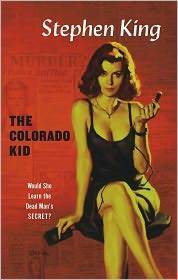

To be honest this book I've read mostly out of curiosity, since one my favorite TV series, Haven, is based on it. The thing is though that after reading the book I've come to realize that its connection to the series is so light that if I didn't already know it existed, I'd be really surprised if I ever found out about it. What the creators of the series did was take one of the many mysterious cases mentioned in the novel and built on it, while bringing at the same time to the forefront some of the secondary characters.
But, let's take things from the beginning. In 1980 a young couple discovers on the shores of an island in Maine, the corpse of a man, to whom the authorities bestow the nickname The Colorado Kid. No one seems to know who he is and how he ended up there, while at first even his death is a mystery of sorts.
We learn about the story of the Kid, as well as about some other strange occurrences and phenomena that have taken place in the region, through the collaborative narration of the two elderly journalists, who run the local newspaper. Their audience is a young and beautiful intern, who thinks that she has a lot to learn from the two men. The question is though, can she believe them? Well, that's not so easy to do since what they tell her, doesn't really make any sense. According to them, strange things have always been happening around there, which over the years claimed an important role in the local folklore: once a group of people fell victims to mass poisoning from drinking tea, an adventure from which only two of them survived, with one of them showing no symptoms whatsoever; at some other time an utterly deserted ship washed to shore and as the locals have it, it was some ghosts that led it there; and after that, the really unexpected happened, an Unidentified Flying Object was spotted by many people in the sky over the town.
Stephenie, the young woman, listens attentively to the two men, she absorbs their stories and tries to discover all by herself and within her own soul, the answers to the mysteries that her mentors talk about. The two of them seem not only to want to test her analytical capabilities, but also to challenge her logical mind, and thus open her eyes to the realities that she could never up to that moment believe to exist.
While reading this book the reader gets the feeling that somehow, somewhere there's a rational explanation for everything that's happening, but the mystery keeps challenging his senses and the myth keeps his attention alive and alert. Some of the answers will come to light by the end, some won't. But, one way or another, what matters most is the story, and this is a good one. The author is not interested in playing the fear card, he just wants to tell a story and that he does splendidly.
If any of you have watched the series I'm sure that by reading this book you'll only recognize but a few points of reference: the two journalists, the landscape, the female version of the Colorado Kid and maybe one or two of the stories. However, I'd like to congratulate the people behind it for managing to create a whole world, with a pantheon of great characters and plots full of mystery, taking their inspiration from a short novel like this. They really did a great job.

Published on March 07, 2012 04:40
March 5, 2012
Book Review: Children of the Street by Kwei Quartey
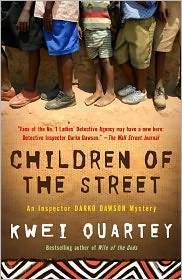

This is one of those novels that are not so easy to read. Not because of the writing, which is excellent, but because of the subject matter, which is as bleak as it can get.
If I could use just one word to describe this book I would say that it's a document; the document of a harsh and heart-breaking reality in a brutal place.
The main protagonist in this story is Inspector Darko Dawson, who works for the police force of Ghana's capital city, Accra. Darko is one of those rare or rather unconventional creatures that really care about what goes on around them, and who sees the world as it truly is and not as he wished it to be. And this world is cruel. Accra may be a big cosmopolitan city, but behind its sometimes bright picture lies a somewhat grim reality. And it's exactly this reality that keeps him constantly on the move, which makes him walk time and again around the dangerous alleys and the most frightening neighborhoods of the city, trying to offer help and protection to the people who need it.
Of course it's not that easy to work under circumstances like these: of utter poverty, where contagious illnesses are all too common and where prostitution is for many people a way of life; the only means they have to survive.
Darko is especially fond of the children of the street, kids with no hope and no future, and kids who are really trying to get themselves out of the gutter and live to see a better day. So when one of those kids is found dead outside a slum, killed in a brutal way, he's more determined than ever to find out who the killer is.
His investigations will lead him again and again from one dead end to the next, but during this arduous journey into the dark heart of the city, he'll come to discover a lot of its heinous secrets; secrets that will trouble his soul for a long time to come. Accra, his city, seems to be nothing more than a desperate place, inhabited by desperate people. And it's also a place where the men who have the means always get their way. During his search for the truth he will meet with young prostitutes and gang members, with pimps and black marketeers, and he will come in contact with a few philanthropists, who seem to hide too much evil and spite behind their bright smiles. Wherever the road leads him though, whatever he sees and finds out, he'll never stop looking for the truth. The children of the street are his children and he'll do anything to save them or at the very least protect them from the evil that lurks out there.
A great novel about a country, or even a continent, that's trying hard to resist the ill fortunes of the modern times, but which also, more than anything else, is in deep pain, always suffering from one hardship or another.

Published on March 05, 2012 01:25
February 29, 2012
Book Review: The Train by Georges Simenon
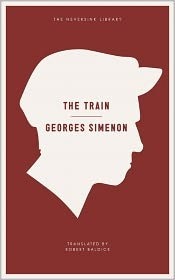

Georges Simenon became famous for his crime novels, in which one of the most celebrated detectives of all times, Inspector Maigret was called upon to solve various mysteries time and again. The Train though is not a crime novel, but a kind of a love story that takes place during the Second World War.
The protagonist Marcel Féron lives with his family in a small provincial town when the invasion by the German Army begins, so with the war at their doorstep they, like it or not, have to flee to safety. Thus they board a train full of refugees that will hopefully bring them to the south of France.
The family though is separated from the very beginning and his wife and kids end up in one carriage and him in another. They meet every now and then, but as the time goes by, that doesn't happen too often anymore. And at some point they lose each other altogether.
Marcel will continue his south bound journey, during which he will come to meet a beautiful and mysterious woman, all dressed in black, that goes by the name of Anna, and with whom he'll begin a somewhat odd love affair, while his family is probably at some faraway place. Anna, who as the author points out, didn't need words and did not like them, obviously has a lot of secrets, which she's not willing to share, while he, on his part, is not that interested to find out. Besides he thinks that their meeting is nothing more than a secret rendezvous with fate.
As they say though, all good things come to an end, and so will their relationship. Their roads will drift apart and he'll go back to the place where he came from; feeling nor sad nor defeated, but glorious and happy, since he's been able to live a big adventure and come out of it unscathed and, in a way, a better man. As for her, she'll follow her own destiny; she'll walk in beauty and in danger.
This is a lovely book, with beautiful prose and a masterful analysis of the soul, which offers the reader a brief but fruitful journey into the landscapes of war and love.

Published on February 29, 2012 23:54
Maria Polidouri – Turn Off This Light
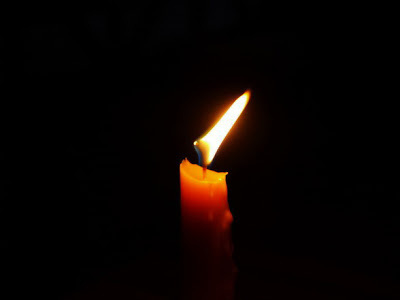
Oh, turn off this light!
What good does it do to the night?
The day has passed and that's enough.
Who knows if not my sleep
Around the corner lurks,
And if it misses its chance,
The one I await, to come.
I have my soul in my teeth
The sobs have left
My breasts weary.
Take the light! The time has come
To stand alone at last.
Of this travesty of a life I've had enough.
And every effort on my behalf is yet an enemy
To fight before my final battle.
Oh, let all the sighs subside.
Let there be something for me with which
I can fool the night
So that is can stoop with added warmth
Over my restless eye.
Take the light! This is the moment!
I want it all for mine.
The time has come to go to sleep.
Take the light! It tortures me…
My soul is what to me it cold-heartedly denies.
© For the translation: Lakis Fourouklas

Published on February 29, 2012 00:29
February 27, 2012
Book Review: The 7th Month by Lisa Gardner
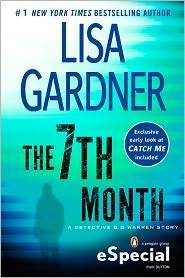

This story came out only as an eBook and as I read in the net this is the first ever short story that Lisa Gardner has written, whose last novel Catch Me I've reviewed recently.
The 7th Month was released just a few days before the latter and as the title suggests the author's heroine, D.D. Warren, is in the seventh month of her pregnancy. As we soon find out being in that condition makes her feel kind of unhappy. D.D. loves to be on the move, to be active, to hunt and capture killers, and now that, whether she likes it or not, she's stuck in an office in Boston P.D. doing nothing much, she seems lost. Thinking too much; this is her problem these days. When you don't act, you think, and she sure has a lot to think about. D.D. when she has to fight crime, to face dangerous situations, she always comes on top. But when she has to cope with domestic issues, like settling down at last and starting a real family, well, then she feels at a loss. Alex, the father of her unborn child, that wonderful man that never pressures her into doing things she doesn't like, and who doesn't ever interfere with her professional life, the man that understands her like no other, has just asked her to move in with him, and she doesn't know what to say. And the biggest problem is that he wants her answer today. Today? Isn't that a bit too soon? And what is she supposed to do?
In walks Donnie Bilger, an executive producer, who, if momentarily, manages to save her from her thoughts and her big dilemma. Bilger wants to hire a detective as a consultant for a movie project. The money he offers is way too much and thus, D.D., with her boss' approval, decides to take the job herself, since now she has to think about the future of her child as well. As she's to find out they need her right away, that very same night, since the previous consultant, a retired cop, has put on a disappearing act.
When she finally arrives at the place where the movie will be shot, a cemetery, the night has fallen and it's freaking cold. Things however will not exactly play out the way she expected them to. On her way there she was looking forward to a somewhat peaceful, but well-paid shift, but arriving at the scene she will find herself in the middle of mayhem and chaos, in the epicenter of a criminal cyclone that will include: aspiring actors, cold-blooded killers, Russian mobsters, money laundering and so forth. As it seems, wherever she goes trouble follows. But maybe, just maybe, something good will come out of this messy situation she found herself in, at the end.
A well-crafted story with a few twists and turns and some surprises and the manual of a good assassin as an added bonus. A short, but nevertheless enjoyable read.
[image error]

Published on February 27, 2012 21:49
February 23, 2012
Book Review: Budapest Noir by Vilmos Kondor
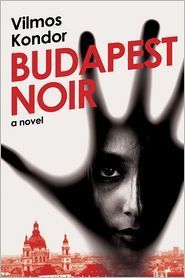

I guess the title tells it all, as in this book we do indeed have a Budapest Noir. However it's not a modern day noir, since the events it describes take place in the famous city in 1936, just after the death of a populist leader who wanted to impose a fascist regime.
The good Hungarian author, who was born in 1954, gives us a bleak view of the city, whose people seem to constantly walk on a tightrope between dream and desperation. On the one hand we have the politicians with their big words and never-ending promises, on the other we have the hopes of the poor for a better future, and finally we come face to face with an everyday reality that is so harsh that it offers most of the people nothing but an occasional smile, while filling them with sorrow and fear at the same time.
It is in this city, and under these exact circumstances, that the main protagonist in the story, journalist Zsigmond Gordon, is looking for the next scoop; the big story that will make a small or bigger difference in people's lives. Gordon is one of those reporters that enjoy nothing more than being on the hunt. He looks around him all the time, in search of something, anything; he moves across the city time and again and every now and then, in order to make things work, he uses, or gets used by, his sources in the police force. And he is one of those people who'll do anything to tell the story, once he decides that it's worth telling, even put his life on the line. It is exactly this particular weakness, if you can call it so, that a man called Vladimir Gellert, a police inspector and part-time friend of Gordon's, will try to exploit. He'll give him in an indirect way a story that he, a slave of the politicians whims, cannot properly investigate; and what a story it is!
It all begins when the corpse of a young and beautiful woman is found in one of the most infamous areas in the city. The deceased doesn't carry any document that can show who she really is, and the only thing they discover in her bag is a Jewish prayer book.
Gordon, more curious than even, is determined to find out how come such a beautiful, seemingly educated and probably religious woman, ended up dead in a place like that. So he'll start wandering around, meeting people and asking questions again and again, without receiving any clear answers. But he doesn't give up. His stubborn investigation though lands him into trouble; not only because it seems to lead nowhere, but also because it gets some very important and thus powerful people, upset. Why doesn't he simply give up? What will it take to make him back off? Is he willing to risk everything to solve the case? Well, about his personal safety he cares not, but there are some other people whose lives he cannot jeopardize. However, protecting them will not prove such an easy thing to do as his enemies always seem to be a step ahead.
The author, using this crime as his stepping stone, moves ahead and leads the reader into an epoch of great change, as far as the history of central Europe is concerned. The picture he paints is gray to black; the city that in the eyes of the modern day traveler seems like a dreamscape here looks kind of nightmarish. He writes about prostitution, organized crime, the power games between the politicians, and about some people who are willing to do just about anything, to betray everything and everyone, in order to make things work their way.
This is a book that could be read as a thriller, a chronicle, or even a social commentary. I'm sure that fans of crime fiction will enjoy it, but I'd also recommend it to everyone who's interested in reading a good story. The genre is not an issue here.[image error]

Published on February 23, 2012 01:04
February 20, 2012
Book Review: Dogma by Lars Iyer
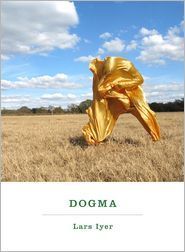

Dogma, unlike the author's previous novel, Spurious, has received mixed reviews. The latter was welcomed as a masterpiece, but when it came to the former the critics were not that enthusiastic. Now that I have read the novel I can say that I really wonder why? Why did they not like it as much as Spurious? For me this a great novel, as it combines humor, irony, philosophical thought, amazing discussions-monologues and a peripatetic mood.
Even though Dogma is the second novel in a not so closely knit trilogy, which will come to its end next year with the Exodus, one can easily read it as a standalone volume.
The main protagonists in this story are two friends: W, who's a Catholic Jew atheist and Lars, who's more or less, or rather less than more, Hindu. The first thinks too much and philosophizes a lot about the end of days, while at the same time he's preparing two projects on capitalism and religion ("Capitalism is the evil twin of true religion," he claims), while the second just lives, or maybe I should say survives, in the shadow of his friend. I think that this is one of the oddest couple of friends that I've ever encountered in world literature. They are so different from each other that the only thing that seems to keep them close together is the simple fact that no one else could ever put up with them. W on the one hand, never stops thinking and talking, every now and then he points his poisonous words towards his friend, who's a non-thinker, he often enough throws one-liners in their conversations while trying to make a point, he gets angry and revolts constantly, at least in his head, and he makes new decisions all the time; decisions which sometimes he sticks to, but most times he doesn't; to put it simply he's not only a man of words, but also one of action. As for Lars, who's the narrator, he simply seems to be nothing more than a receptacle. He just listens to his friend, he puts up with his whims, he follows him in his varied adventures, he learns from him, and every now and then, when he absolutely has to, he opens his mouth to say a few words to appease the spirits and bring serenity to W's soul. Most of the times all he has to do to achieve that is quote the Vedas or tell him stories from the Hindu mythology.
Their dialogues, or rather W's monologues, are simply a joy to behold. And, as one would expect, quotation time it is: "You should never learn from your mistakes"; "We must read if we want to live"; "We're not capable of god"; "Philosophy's like an unrequited love affair"; "Always claim the ideas of others as your own"; "The Dogma must always be drunk"; "Only the hopeless can truly understand the everyday."
W looks and sounds like a prophet of the end. He expects catastrophe to hit the earth any time now; and he feels that more strongly than ever in America, where the ignorant natives apart from having no Plymouth Gin for sale, they have also "made a Disneyland of Armageddon."
"It's time to die," he says at the end, "but death does not come." Thankfully, I should add; because if it did then we'd miss the opportunity to enjoy the third part of his unique mental and physical escapades.
Highly recommended to everyone out there who loves good literary fiction.

Published on February 20, 2012 23:40
February 17, 2012
Book Review: Raylan by Elmore Leonard
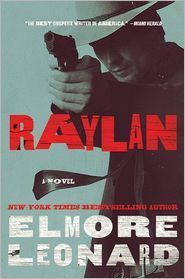

Raylan is the protagonist of the TV series Justified, and a man we've met more than once before in Elmore Leonard's stories.
In this book, that kind of makes us think that it's not novel but rather a collection of interconnected stories, we follow Raylan as he's called to investigate three different cases. The first one has to do with the removal of the kidneys of a known criminal and then the offer from the perps to sell them back to him; the second concerns the murder of an ex-miner, who suffered a lot during his stay with the company and afterwards as well; and finally the third follows the footsteps of a rather brilliant college student, who after losing a lot of money playing cards decides to hit the road and head to Las Vegas, looking for the big score.
As one would expect from a Leonard book its strongest points are the characters and the dialogues. Be Cool; that seems to be Raylan's mantra, and cool he is. He is a Marshall, an enforcer of the law, who has his own individual sense of justice and who follows his own rules; someone who doesn't seem to care how justice is done, as long as it is done. So, when he investigates the kidneys case the only thing he's interested in is solving it and arresting the perps, he doesn't care even a little bit, that the men in question are the sons of one of the biggest drug lords. When he tries to prove that the death of the ex-miner did not occur as an act of self-defense, but rather that it was a cold-blooded murder, he does not hesitate to clash head to head with his temporary employer, a sexy yet ruthless woman, and when the final solution comes about, though highly unorthodox, doesn't make him break a sweat. And when he accidentally bumps into the runaway girl, instead of arresting her on the spot he gives her a chance to make things right. In Raylan's world the end justifies the means. And in his world, one way or the other, justice is always served.
Raylan however is not the only unique, in his ways, hero in this novel. The baddies are just as interesting as him, or even more so. We have old man Crowe, who no matter what has his own set of rules; Rita, a kind of housekeeper for the man and his occasional lover, and the only person he can totally trust along with, Raylan; and then comes an adventuress, a woman with a heart of ice: "This was a cool woman with evil ways. The best kind." And finally we have someone who betrayed all her beliefs, if she had any, who chose to forget her past and do everything and anything she possibly could to secure herself an unknown yet brilliant future; one who believed that she could and would have all there was to have, and couldn't take no as an answer; a victim of her own making.
Raylan's adventures offer the reader something similar to a roller coaster ride; they are cool and they are exciting, without seemingly trying to be so.
Highly recommended to all the fans of the good writer, but also to every single soul out there that enjoys a good old crime novel. I'd say that Raylan is here to stay.

Published on February 17, 2012 03:10
February 15, 2012
Book Review: Me and You by Niccolo Ammaniti
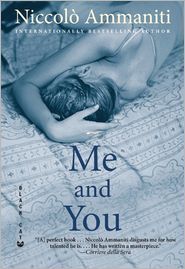

This is one of those books that somehow manage, in an almost magical way, to steal a reader's heart; and that not so much because of their myth, but because of the prose; a prose that sounds tender, almost nostalgic, and which every now and then seems to converse with the silence and the psyches.
This is the story of Lorenzo, a fourteen year old boy that doesn't seem to do well in the world he lives in, but who also tries hard not to show it. And that, because of his mother, whom he deeply loves, and whose aura for some reason reminds him of Morocco.
"Life is sad without a sense of humor," the author says, and that's exactly the element that's missing from the boy's life. Whatever he does he can never feel glad, not even a little bit happy. Apart from his mom the only other person he seems to get on well with is himself.
His parents cannot really understand him and feel sorry for him, and that's why he decides to take a trip to the mountains with some of the popular kids in his class. But of course that trip will never come to be, because he just made it up. His plan is simple: while his parents will feel happy thinking that he's at last at some faraway place and having fun with some other people, he'll be hiding in a long forgotten storeroom in the basement of their building.
At the beginning everything goes according to plan: He stocks his humble abode with all the supplies he'll need for his week-long stay and then spends some quality time with himself, playing video games, watching TV and thinking deeply about his life; "Why did I have to be just like the others?" "On my own I was happy, with the others I always had to pretend."
Now, hidden as he is in his beloved basement and isolated from the whole world, yes, he does feel a little bit happy. Life, however, is not about to leave him in peace for long. So, in comes Olivia, his half-sister who has serious drug abuse issues, and who from one moment to the next smashes his fragile, but seemingly secure, world to pieces. Thus the free man becomes the slave; a slave to her needs; her personal slave. Someone has to help her fulfill those needs, and if not Lorenzo, then who?
Ammaniti seems to closely observe and analyze the dynamics that develop between these two young souls; dynamics that somehow seem to presage a complete catastrophe. As it seems the one simply cannot stand the other. However, like it or not, they need each other, because if their secrets come to light they both have a lot to lose. So they form an alliance, one that will help them survive their troubles, make them realize some things, and give them the chance to see their selves as they truly are. The fall for the two of them doesn't seem to be far, but neither is the recovery. Just as Olivia writes to her father: "I have to learn not to hate you," Lorenzo needs to learn how not to hate living with the other people.
A well-written novella that can easily be read in a single sitting, and which has a lot to say to the observant reader. Highly recommended.

Published on February 15, 2012 02:37
February 14, 2012
Maria Polidouri - Only Because You Loved Me
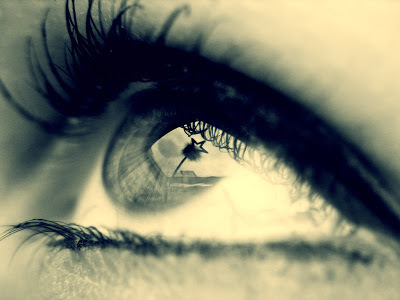
I sing not but because you loved me
In times gone by.
And in the sun, in the summer's waking wait
And in rain, and in snow,
I sing not but because you loved me.
Only because you held me in your arms
One night and you kissed my lips,
Only because of that I'm pretty as a lily in full blossom
And I can feel a chill running through my soul,
Only because you held me in your arms.
Only because your eyes have looked at me,
With their soulful gaze,
I've proudly adorned myself with my being's
The ultimate diadem,
Only because your eyes have looked at me.
Only because as I was passing by you noticed me
And through your glance I saw drifting by
My delicate shadow, like a dream,
Playful and in pain,
Only because as I was passing by you noticed me.
Because kind of reluctantly you called for me
And you tended your hands for me to hold
And you had in your eyes that special blur
Of a love that of limits knows naught,
Because kind of reluctantly you called for me.
Because, only because it was dear to you
That's why my passage was a thing of beauty.
It was as if you followed my every step,
Or as if you were passing somewhere nearby.
Because, only because it was dear to you.
Only because you loved me I was born,
That's why I was given the gift of life.
In this graceless life the often unfulfilled
My life has found fulfillment.
Only because you loved me I was born.
Only because of your exquisite love
The dawn has filled my hands with roses.
To shine a light for a moment upon your path
The night has adorned my eyes with stars,
Only because of your exquisite love.
Only because so beautifully you loved me
I've lived, to make your dreams
Aplenty, you fair one that ruled my heart
And thus in peace I die
Only because so beautifully you loved me.
© For the translation: Lakis Fourouklas
Image taken from here

Published on February 14, 2012 03:37























